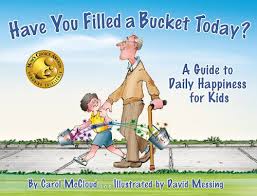Book Review
Have you filled a bucket today?A guide to daily happiness for kids
By: Carol McCloud
Have you filled a bucket today? is an award winning children’s book written to teach young children how to become bucket fillers. The book is easy to read and uses colourful illustrations to help children stay engaged. The book describes how every child has an invisible bucket that represents their mental and emotional health. Experts in infant brain research say it is helpful to think of every baby being born with an invisible bucket. It is primarily the parents and caregivers responsibility to fill a child’s bucket by regularly holding, nurturing, touching, singing and playing with their children. By doing this you are filling you child’s bucket.
The story introduces the idea of the invisible bucket and also describes various ways a child can practice filling their own buckets and those of others around them. The author shares that everyone has a bucket and how filling someone else’s bucket can also fill your own bucket. In this way, the book teaches children that in addition to being loved, it is important to learn how to love others. The author states, children who learn how to express kindness and love lead happier lives.
How can parents use this book?
- As you read this book with your children, use it a chance to model what bucket filling looks like. You can share with them why they are special to you and explore ideas together about how they can fill someone else’s bucket that day.
- “Bucket filling” can turn into a daily household word in that a parent can ask their child if they have filled their bucket each day. With daily practice, children will experience the enjoyment and satisfaction of bucket filling which can strengthen their emotional and mental health over time.
- When a child acts in a mean way or makes fun of someone, you can also teach them that is being a “bucket dipper.” Bullies are bucket dippers because they make a person feel sad and hurt. Parents can describe that people who dip into other people’s buckets usually have empty buckets themselves. But if we fill another person’s buckets, we fill ours as well.

